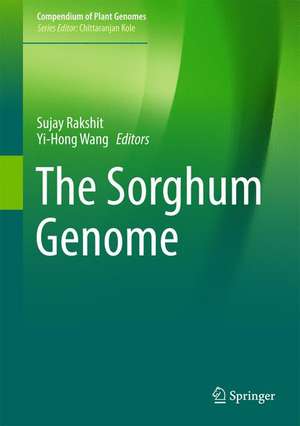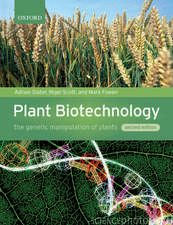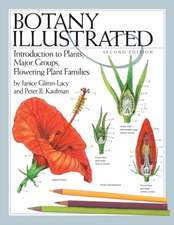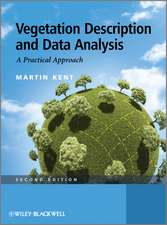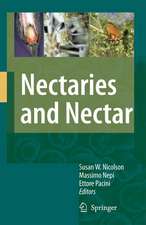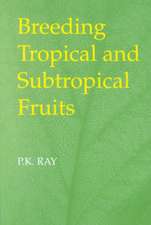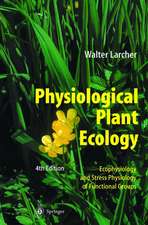The Sorghum Genome: Compendium of Plant Genomes
Editat de Sujay Rakshit, Yi-Hong Wangen Limba Engleză Hardback – 30 ian 2017
| Toate formatele și edițiile | Preț | Express |
|---|---|---|
| Paperback (1) | 948.16 lei 6-8 săpt. | |
| Springer International Publishing – 13 iul 2018 | 948.16 lei 6-8 săpt. | |
| Hardback (1) | 955.56 lei 6-8 săpt. | |
| Springer International Publishing – 30 ian 2017 | 955.56 lei 6-8 săpt. |
Din seria Compendium of Plant Genomes
- 24%
 Preț: 783.65 lei
Preț: 783.65 lei - 18%
 Preț: 948.92 lei
Preț: 948.92 lei - 15%
 Preț: 643.34 lei
Preț: 643.34 lei - 15%
 Preț: 643.84 lei
Preț: 643.84 lei - 18%
 Preț: 950.21 lei
Preț: 950.21 lei - 18%
 Preț: 956.18 lei
Preț: 956.18 lei - 18%
 Preț: 1398.00 lei
Preț: 1398.00 lei - 18%
 Preț: 1396.89 lei
Preț: 1396.89 lei - 15%
 Preț: 645.28 lei
Preț: 645.28 lei - 18%
 Preț: 1119.74 lei
Preț: 1119.74 lei - 18%
 Preț: 947.98 lei
Preț: 947.98 lei - 18%
 Preț: 954.93 lei
Preț: 954.93 lei - 18%
 Preț: 957.44 lei
Preț: 957.44 lei - 18%
 Preț: 1114.97 lei
Preț: 1114.97 lei - 18%
 Preț: 956.69 lei
Preț: 956.69 lei - 18%
 Preț: 951.91 lei
Preț: 951.91 lei - 18%
 Preț: 952.89 lei
Preț: 952.89 lei - 18%
 Preț: 952.57 lei
Preț: 952.57 lei - 18%
 Preț: 953.97 lei
Preț: 953.97 lei - 18%
 Preț: 950.33 lei
Preț: 950.33 lei - 18%
 Preț: 1228.96 lei
Preț: 1228.96 lei - 18%
 Preț: 951.77 lei
Preț: 951.77 lei - 15%
 Preț: 643.48 lei
Preț: 643.48 lei - 15%
 Preț: 646.30 lei
Preț: 646.30 lei - 18%
 Preț: 1113.26 lei
Preț: 1113.26 lei - 15%
 Preț: 643.65 lei
Preț: 643.65 lei - 15%
 Preț: 633.53 lei
Preț: 633.53 lei - 18%
 Preț: 956.03 lei
Preț: 956.03 lei - 18%
 Preț: 951.59 lei
Preț: 951.59 lei - 18%
 Preț: 1119.56 lei
Preț: 1119.56 lei - 18%
 Preț: 1115.46 lei
Preț: 1115.46 lei - 18%
 Preț: 946.41 lei
Preț: 946.41 lei - 18%
 Preț: 950.33 lei
Preț: 950.33 lei - 18%
 Preț: 955.56 lei
Preț: 955.56 lei - 18%
 Preț: 951.77 lei
Preț: 951.77 lei - 18%
 Preț: 947.98 lei
Preț: 947.98 lei - 18%
 Preț: 1669.96 lei
Preț: 1669.96 lei - 18%
 Preț: 1123.98 lei
Preț: 1123.98 lei - 18%
 Preț: 1114.52 lei
Preț: 1114.52 lei - 18%
 Preț: 954.62 lei
Preț: 954.62 lei
Preț: 955.56 lei
Preț vechi: 1165.32 lei
-18% Nou
Puncte Express: 1433
Preț estimativ în valută:
182.86€ • 189.76$ • 152.85£
182.86€ • 189.76$ • 152.85£
Carte tipărită la comandă
Livrare economică 15-29 martie
Preluare comenzi: 021 569.72.76
Specificații
ISBN-13: 9783319477879
ISBN-10: 3319477870
Pagini: 284
Ilustrații: XIV, 284 p. 13 illus., 10 illus. in color.
Dimensiuni: 178 x 254 x 18 mm
Greutate: 0.74 kg
Ediția:1st ed. 2016
Editura: Springer International Publishing
Colecția Springer
Seria Compendium of Plant Genomes
Locul publicării:Cham, Switzerland
ISBN-10: 3319477870
Pagini: 284
Ilustrații: XIV, 284 p. 13 illus., 10 illus. in color.
Dimensiuni: 178 x 254 x 18 mm
Greutate: 0.74 kg
Ediția:1st ed. 2016
Editura: Springer International Publishing
Colecția Springer
Seria Compendium of Plant Genomes
Locul publicării:Cham, Switzerland
Cuprins
Economic/Academic importance - Gebisa Ejeta.- The botany and taxonomy of Sorghum - A Ashok Kumar (Alternative: Dr Sally Norton).- Cytological details of genome - S Rakshit.- Molecular mapping of genes & QTLs - WL Rooney (Alternative: Alex Feltus; Clemson).- Positional cloning of important stress adaptation genes - J Magalhaes.- Structural & functional genomic resources developed - S Deshpande (Alternative: Ming Li Wang).- Progress on whole-genome sequencing - Bradley C Campbell.- Background history of the national and international genome initiatives, public and private partners involved - A Paterson (Tentative only).- Software for genome assembly and annotation - Shuaishuai Tai.- Population genomics tools - Celine Frere.- Synteny with allied & model genomes - P Rajendrakumar.- Genomics approaches to abiotic stress resistance - Marc Knight.- Genomics approaches to biotic stress resistance - Emma Mace (Alternative: Guoqing Liu).- Genomics approaches to improved quality - IanGodwin.- Community resources for molecular breeding - Tushar Shah.- Impact on germplasm characterization & gene discovery - John E. Erpelding.- Impact on plant breeding - Gary Peterson.- Future prospects - Ian D Godwin and S Rakshit.
Textul de pe ultima copertă
This book provides insights into the current state of sorghum genomics. It particularly focuses on the tools and strategies employed in genome sequencing and analysis, public and private genomic resources and how all this information is leading to direct outcomes for plant breeders. The advent of affordable whole genome sequencing in combination with existing cereal functional genomics data has enabled the leveraging of the significant novel diversity available in sorghum, the genome of which was fully sequenced in 2009, providing an unmatched resource for the genetic improvement of sorghum and other grass species. Cultivated grain sorghum is a food and feed cereal crop adapted to hot and dry climates, and is a staple for 500 million of the world’s poorest people. Globally, sorghum is also an important source of animal feed and forage, an emerging biofuel crop and model for C4 grasses, particularly genetically complex sugarcane.
Caracteristici
Offers up-to-date insights into the latest advances in genome sequencing and analysis in sorghum Demonstrates how scientific findings in sorghum genomics can be used to improve plant breeding Presents contributions by an international board of authors Includes supplementary material: sn.pub/extras
